简体中文
繁體中文
English
Pусский
日本語
ภาษาไทย
Tiếng Việt
Bahasa Indonesia
Español
हिन्दी
Filippiiniläinen
Français
Deutsch
Português
Türkçe
한국어
العربية
Stocks, Stock CFDs, and ETFs: How to Tell Them Apart?
Abstract:In the world of investing and trading, three common instruments often come into focus: stocks, stock CFDs (Contracts for Difference), and ETFs (Exchange-Traded Funds). While they all offer avenues to engage with the financial markets, they differ significantly in their structure, trading methods, and associated risks. This article thoroughly explains their differences to help you make informed decisions when choosing your preferred trading instrument.
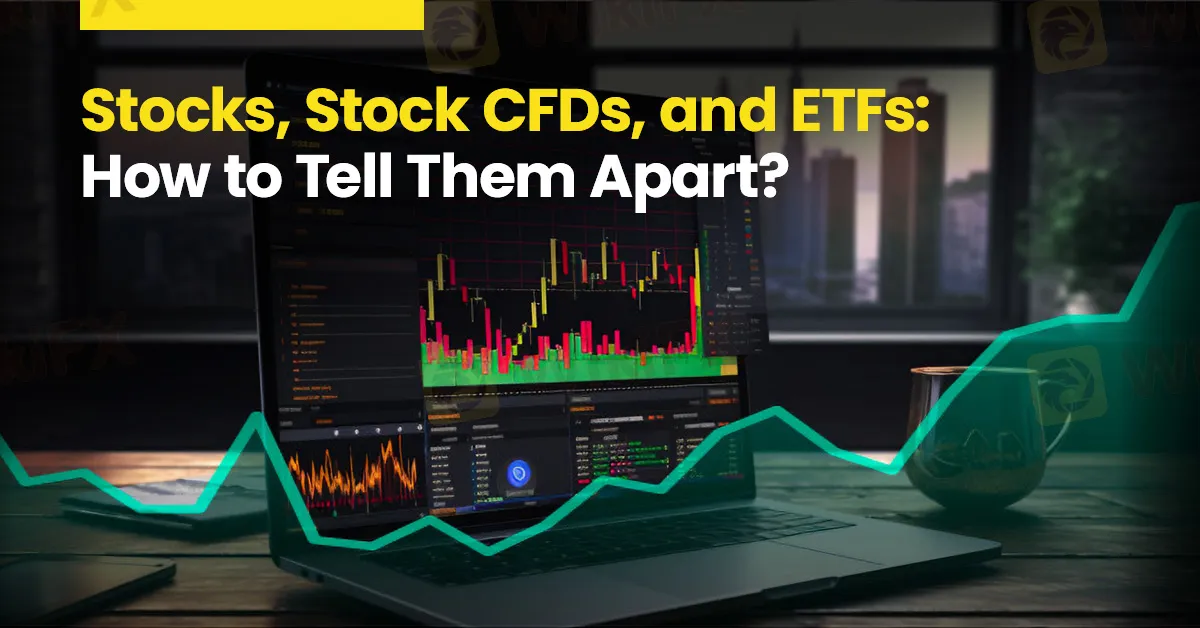
In the world of investing and trading, three common instruments often come into focus: stocks, stock CFDs (Contracts for Difference), and ETFs (Exchange-Traded Funds). While they all offer avenues to engage with the financial markets, they differ significantly in their structure, trading methods, and associated risks. This article thoroughly explains their differences to help you make informed decisions when choosing your preferred trading instrument.
In the world of investing and trading, three common instruments often come into focus: stocks, stock CFDs (Contracts for Difference), and ETFs (Exchange-Traded Funds). While they all offer avenues to engage with the financial markets, they differ significantly in their structure, trading methods, and associated risks. Understanding these differences is crucial for making informed investment decisions.

Stocks represent ownership shares in a company. When you purchase a stock, you are essentially buying a piece of that company. This ownership comes with certain privileges and responsibilities. Shareholders may receive dividends, which are portions of the company's profits paid out to them. Additionally, stockholders often have voting rights, allowing them to influence corporate decisions.
Stocks are traded on stock exchanges such as the New York Stock Exchange (NYSE) or NASDAQ. These exchanges provide a regulated environment where buying and selling occur. However, owning stocks comes with risks. Market risk is a primary concern, as the value of stocks can fluctuate widely based on company performance, economic conditions, and broader market trends. Liquidity risk is another factor, as some stocks might be difficult to sell quickly without affecting their price.

A stock CFD is a derivative that allows traders to speculate on the price movement of a stock without actually owning the stock itself. This financial instrument offers unique characteristics, including the use of leverage. Leverage enables traders to control a larger position with a smaller amount of capital, potentially amplifying both gains and losses.
Unlike stocks, CFDs do not confer ownership of the underlying asset. Instead, traders are merely speculating on price changes. This makes it easier to profit from falling prices, as CFDs facilitate short selling. Additionally, CFDs can often be traded outside regular market hours, providing greater flexibility.
However, trading CFDs carries significant risks. Leverage can lead to substantial financial loss if the market moves against the trader's position. Counterparty risk is also a concern, as CFDs are typically traded over-the-counter (OTC) through brokers, posing the risk of broker default. Market risk remains a factor, with the value of CFDs fluctuating based on various market conditions.

Exchange-Traded Funds (ETFs) are investment funds that hold a basket of assets, such as stocks, bonds, or commodities, and are traded on stock exchanges like individual stocks. One of the key advantages of ETFs is diversification. By holding a variety of assets, ETFs can reduce risk compared to investing in individual stocks.
ETFs are known for their liquidity, as they can be bought and sold throughout the trading day at market prices. They come in various types, including those that track indexes (e.g., S&P 500), sectors (e.g., technology, healthcare), commodities, or specific investment strategies. ETFs are generally cost-effective, often featuring lower expense ratios compared to mutual funds due to their passive management.
Despite their advantages, ETFs are not without risks. Market risk is inherent, as the value of ETFs can fluctuate based on the performance of the underlying assets. Liquidity risk may also be present, especially in ETFs with lower trading volumes. Additionally, tracking error is a consideration, as ETFs might not perfectly mirror the performance of their underlying index due to fees and other factors.
In summary, stocks, stock CFDs, and ETFs each offer distinct opportunities and challenges for investors and traders. Stocks provide direct ownership in a company, along with potential dividends and voting rights. Stock CFDs allow for speculation on price movements without ownership, often involving leverage and additional risks. ETFs offer a diversified, cost-effective way to invest in a basket of assets, traded like stocks on an exchange.
Understanding these differences is essential for selecting the right instrument to align with your investment goals and risk tolerance. Whether you seek direct ownership, speculative trading, or diversified exposure, there is a financial instrument suited to your needs.

Disclaimer:
The views in this article only represent the author's personal views, and do not constitute investment advice on this platform. This platform does not guarantee the accuracy, completeness and timeliness of the information in the article, and will not be liable for any loss caused by the use of or reliance on the information in the article.
Read more
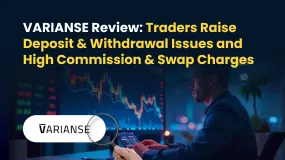
VARIANSE Review: Traders Raise Deposit & Withdrawal Issues and High Commission & Swap Charges
Are you losing both while depositing and withdrawing your capital at VARIANSE? Does the broker give the currency conversion rate excuse for this? Have you been trapped with spreads charged higher than promised? Do you bear steep commission and swap charges at this broker? Traders frequently report these trading issues online. In today’s VARIANSE broker review, we have shared some trading complaints that have grabbed everyone’s attention. Take a look.
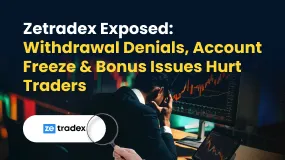
Zetradex Exposed: Withdrawal Denials, Account Freeze & Bonus Issues Hurt Traders
Do you constantly face withdrawal denials by Zetradex? Does the forex broker keep freezing your account and wiping out your capital? Have you also undergone issues concerning the Zetradex no deposit bonus? These trading issues have become apparent as the forex broker allegedly scams traders all over. In this Zetradex review article, we have demonstrated some complaints. Read them to get a feel of what happens to traders here.
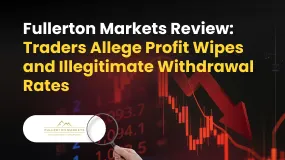
Fullerton Markets Review: Traders Allege Profit Wipes and Illegitimate Withdrawal Rates
Have you witnessed constant profit deletion from Fullerton Markets? Has the Saint Vincent and the Grenadines-based forex broker wiped out all your capital after you checked it on Fullerton Markets Login? Do you find the deposit and withdrawal rates abnormal here? These complaints have been grabbing everyone’s attention on Fullerton Markets Review Platforms. In this article, we have shared some of these complaints for you to look at and inspect. Read on!
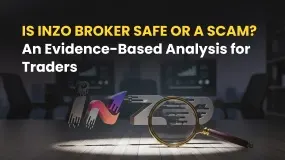
Is Inzo Broker Safe or a Scam? An Evidence-Based Analysis for Traders
When traders check out a new broker, the main question is always about safety and whether it's real. Is Inzo a trustworthy partner for your trading capital, or is it a scam you should stay away from? The broker looks modern and professional, offering popular platforms and many different account types. However, this polished look is clouded by many serious complaints from users who report big problems with their money and trading conditions. A simple "yes" or "no" answer isn't enough. To reach a good conclusion, we need a detailed investigation based on facts. This analysis will give you a clear and fair breakdown of the facts. We will cut through the mixed information to give you a complete picture of Inzo.
WikiFX Broker
Latest News
BASF CEO: EU CO₂ Trading Is A "Destruction Mechanism" For European Industry
Is Fyntura a Regulated Broker? A Complete 2025 Broker Review
PINAKINE Broker India Review 2025: A Complete Guide to Safety and Services
Is Inzo Broker Safe or a Scam? An Evidence-Based Analysis for Traders
Is Uniglobe Markets Legit? A 2025 Simple Guide to Its Safety, Services, and User Warnings
Is Forex Zone Trading Regulated and Licensed?
WikiEXPO Dubai 2025 “Welcome Party” Kicks Off Tonight!
He Trusted a WhatsApp Group and Lost RM659,000
Exness Restricted Countries List 2025 Explained
Zetradex Exposed: Withdrawal Denials, Account Freeze & Bonus Issues Hurt Traders
Currency Calculator



